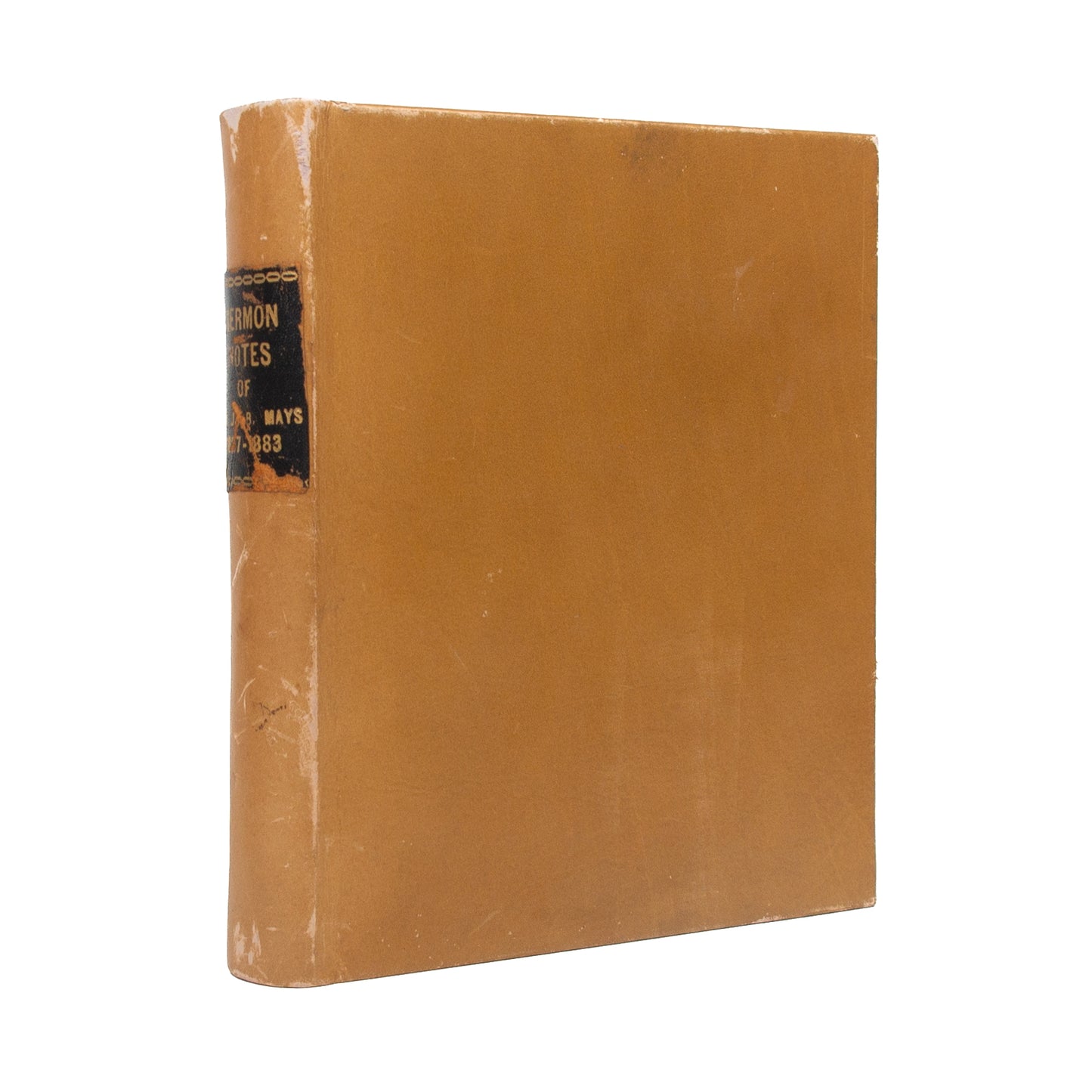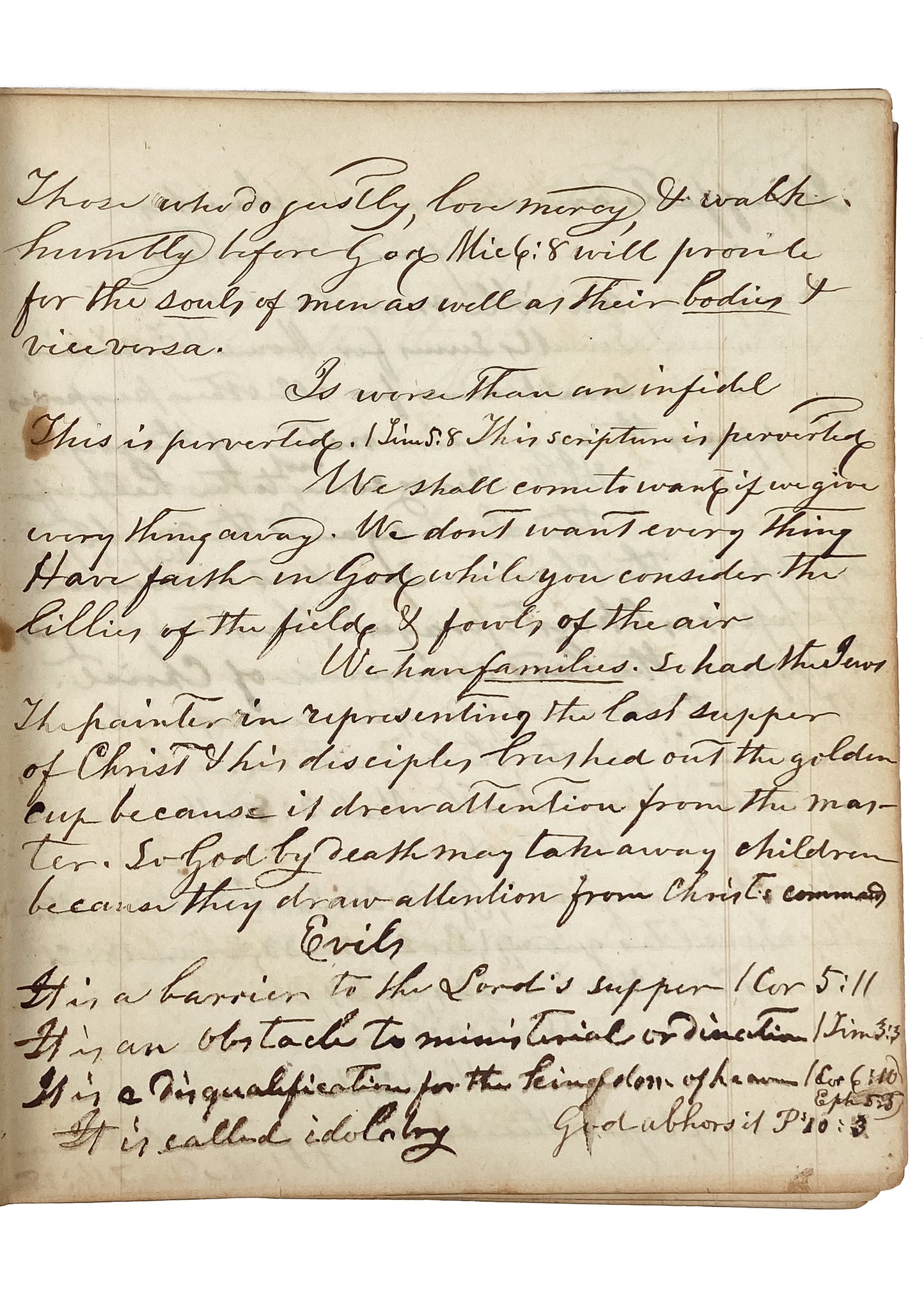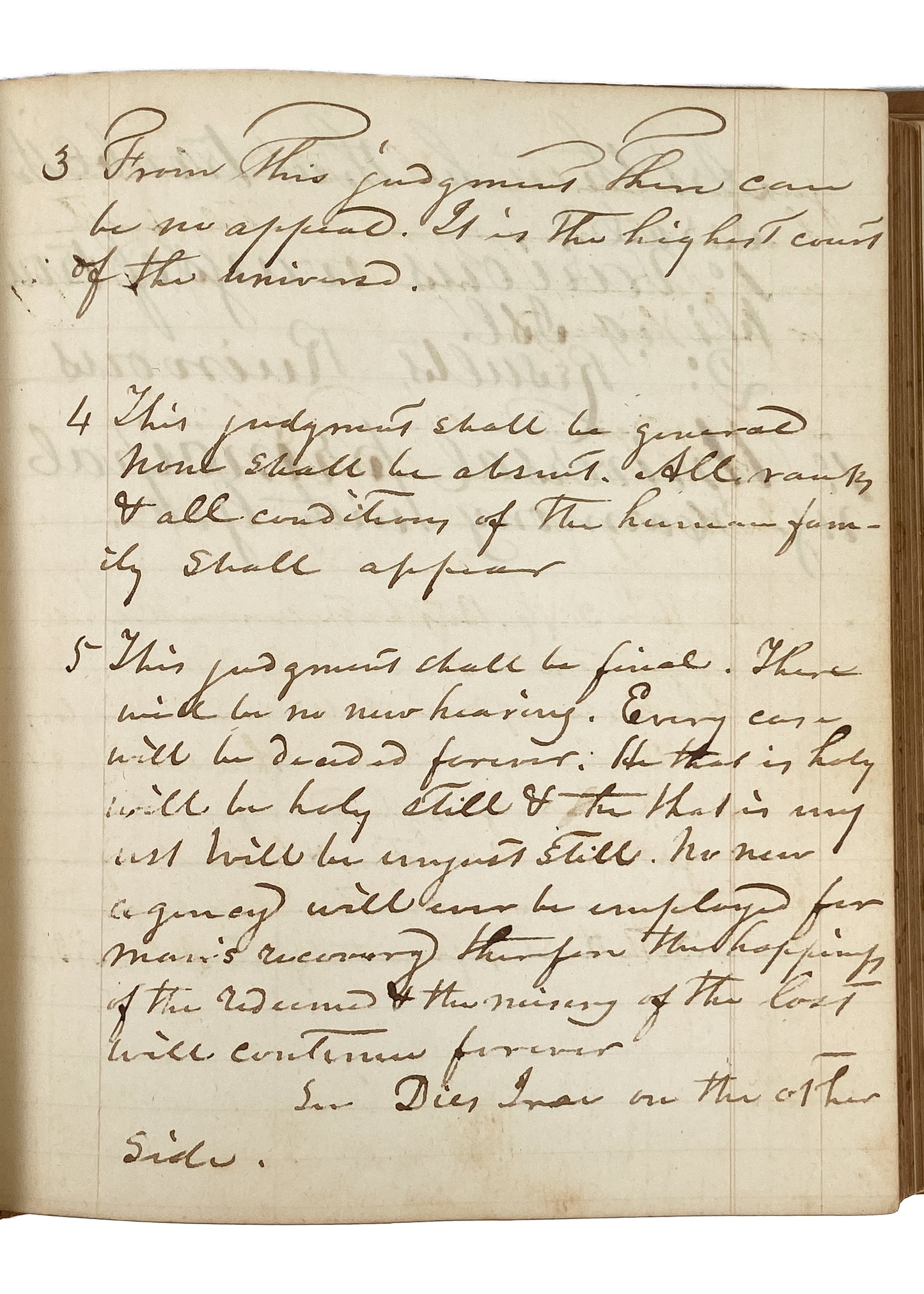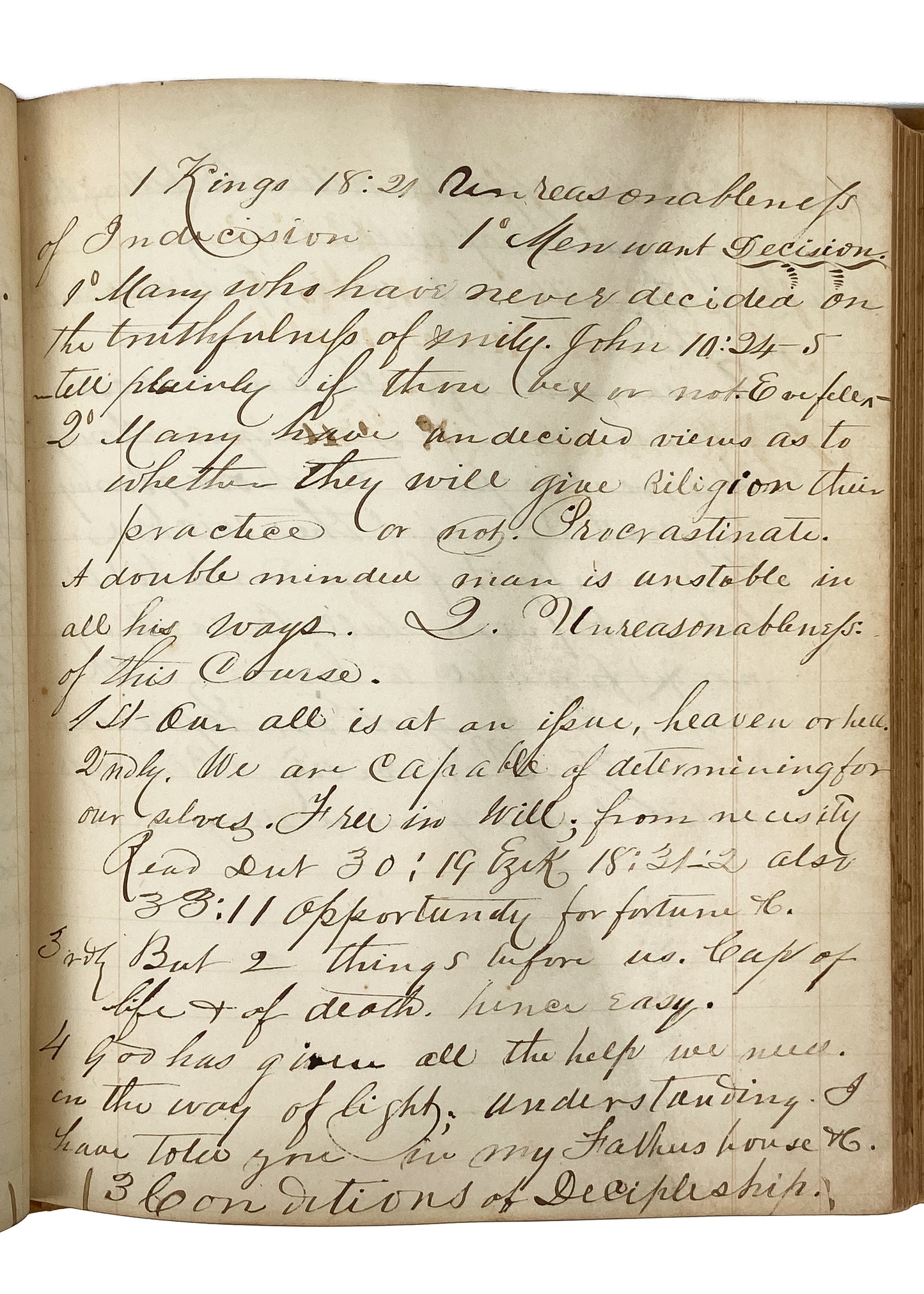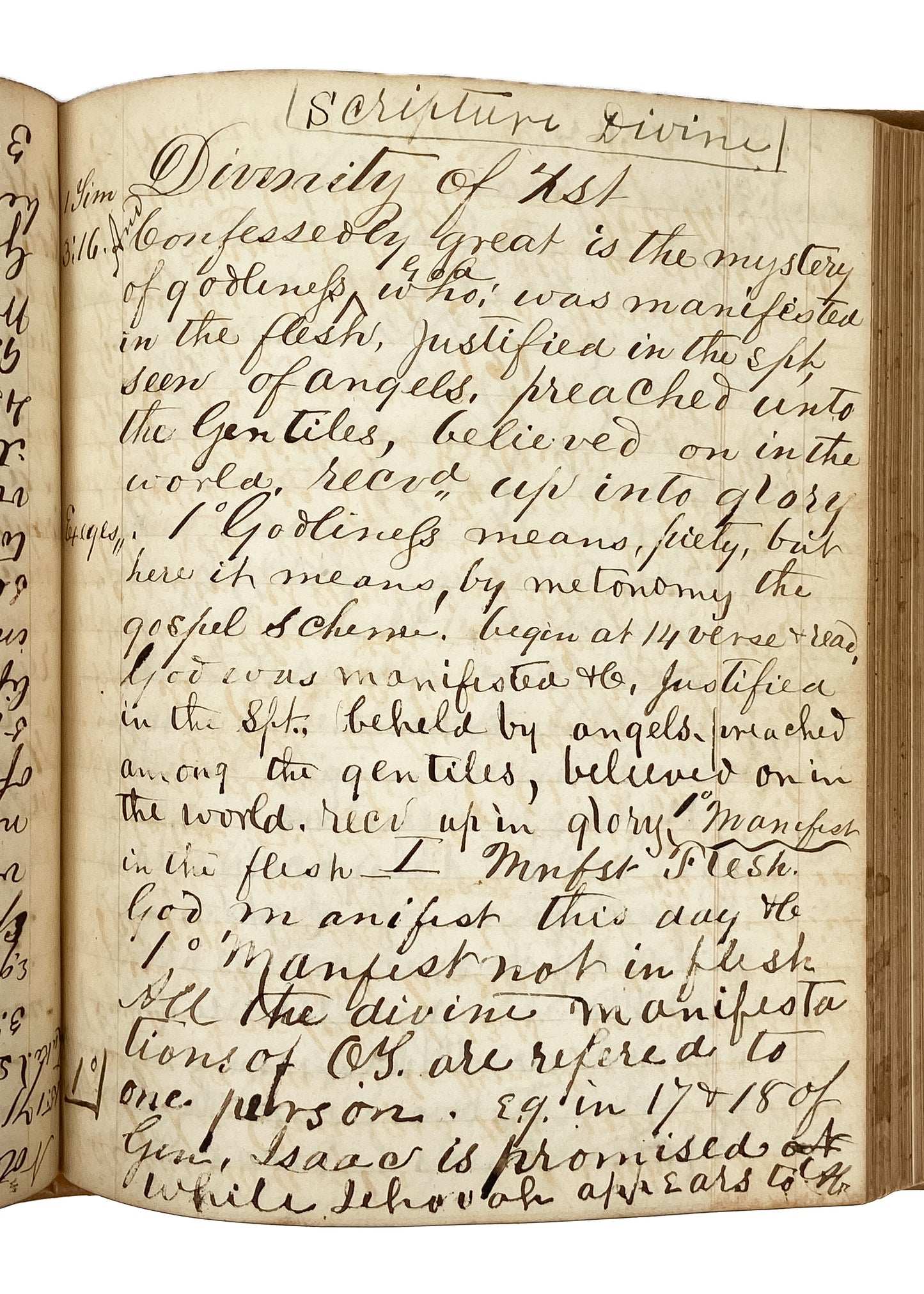Specs Fine Books
1858 IMPORTANT BAPTIST MSs. Sermons Preached on Founding Southern Baptist Theological Seminary
1858 IMPORTANT BAPTIST MSs. Sermons Preached on Founding Southern Baptist Theological Seminary
Couldn't load pickup availability
An exceptional manuscript volume of sermons by pioneering Southern Baptist, J. F. B. Mays.
Elder J. F. B. Mays D.D. [Jonathan Fleming Bingham Mays] was born in Surry County, North Carolina in 1827. His mother expired while giving birth. For support in raising his son, Mays' father returned to their home state of Virginia. There, it seems the young Mays was at first attracted to the Christian Baptists at Lexington, but after a protracted season of prayer and study united with the Baptists in that city [1853]. He began preaching in April of 1854 under supervision of Rev. Horatio Thompson.
Later in 1854, he traveled to South Carolina as a missionary of the Association. While there, he also served as a tutor at Union University, and through his new friendship with James P. Boyce was persuaded to pursue further theological education. Their relationship grew so close, that Mays named his first daughter, Lina Boyce, in his honor.
Upon completion of his degree, he was ordained Pastor of the Mount Moriah Baptist Church in Greenville, South Carolina. According to all accounts, he was an effective pastor, and perhaps even more effective at raising money for various Baptist enterprises, including being charged with raising funds for the new church in Columbia.
By 1858, he was appointed agent to the newly emerging Southern Baptist Theological Seminary, being founded by his old friend, James P. Boyce. So effective was he as a fund-raiser, he was bringing in the equivalent of $2 million per year gathering local groups of Baptists to preach on generosity and the importance of Christian education.
He continued preaching and raising funds for the new Seminary throughout 1860 and 1861 in Alabama and Mississippi. At the outbreak of the war, he became the Confederate Chaplain at the Tuskegee Military Institute and shared his time between pastoring the Baptist church at Talledega, Alabama, and serving as a chaplain to the Confederate troops. Historical records show him to have been an active agent in the protracted meetings and revivals that occurred in the Confederate Camps.
After the War, he continued to raise money for the Seminary for nearly his entire life, preaching almost without break in Alabama, Florida, Mississippi, North and South Carolina, Kentucky, and Tennessee, home of his final pastorate.
It would seem that almost our entire volume of sermons, counting hundreds of pages, are from his work as an itinerant, including dated sermons on generosity, the Christian ministry, covetousness, etc., clearly aimed at raising funds for the Seminary.
The volume itself contains 262 pages of handwritten, unpublished content equating to 30,000-35,000 words.
The sermons date from 1858 forward, and include:
*Sermon on Covetousness [a master in this county with 100 servants & $100,000 in money can have his ground tended without his servants, but will he? He expects his own servants to do his work - The criminal docket in the State amounts to about $50,000. In 80 counties of N.C. $1000 in each is spent on drunkenness, & $1000 in each for gambling. A circus will take in $500 from one neighborhood. . . yet only $1500 for the world's conversion. Agents are objectionable if with an overseer the servants make more after his salary is paid than without him, then he does not injure the plantation. If pastors would preach quarterly, & take quarterly collections for the 4 boards every year at all the churches, or if N.C. Baptists like the English Baptists would give each $1 to F Missions they would annually $50,000 for that object, then we could dispense with agents excepting for Colleges] etc., He then goes argument by argument that could be offered for a lack of generosity to global missions, home missions, and the colleges . . . and answers them all.
*Sermon on The Third Year, which is the Year of Tithing [on systematic beneficence. He talks about generosity among Virginia Baptists, Massachusetts Baptists, and the English Baptists, who he says are much poorer than North Carolina Baptists, etc., He discusses the principle of sowing and reaping; money given to sailors has reaped 4,000 conversions; money given to Dr. Teasdale for Washington DC has led to 1200 conversions, etc.,
And more. Sermons on Benevolence; On the Bible Signs of a New Heart; On Repentance; On True Faith; On Baptism; On Close Communion [Open Communion violates the Disciplines of 1850, etc.]; On the Evils of Monthly Preaching [detailed local accounts]; The Duty of Churches to their Pastor; On Prayer; Wounded Conscience; The Church of Christ; The Strait and Narrow Way to Life; God's Providence and His Own Glory; Seeking God; The Influence of the Holy Ghost in Regeneration; The Deity of the Holy Ghost; Love to Christ; The Parable of the Sower; On the Inspiration of Scripture; Train a Child [Sabbath School Speech]; Distinctive Features in Our Baptist Churches; Elders and Deacons; Christ's Priesthood; Alone with Jesus [Jacksonville, Florida]; etc. etc.
As has already been mentioned, the Seminary itself was founded by James Petigru Boyce [1827-1888]. Trained theologically under Charles Hodge, he was a Baptist with a distinctively Calvinistic strain. True to its roots, SBTS remains reflective of the more Calvinistic branch of the Southern Baptist Convention.
The founding of SBTS remains controversial with relationship to slavery. The Seminary itself, according to some, was founded specifically to create a safe haven for education pro-slavery Baptists, as many of the northern Baptists were strongly abolitionist. This history is wrestled with in detail here: Racism-and-the-Legacy-of-Slavery-Report-v4.pdf (sbts-wordpress-uploads.s3.amazonaws.com)
Later kyvar binding, a few leaves disbound, apparently complete. 262 pages are filled; perhaps 50 more pages are blank. An important piece of Baptist history.
Share
